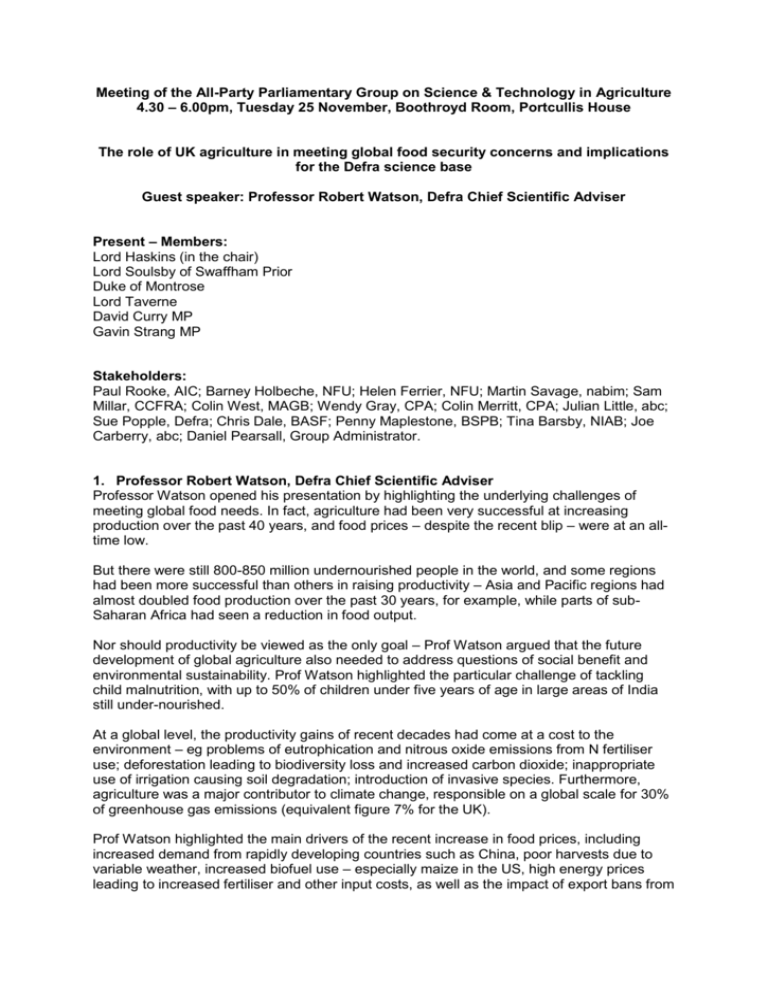Minutes - All-Party Parliamentary Group on Science & Technology in
advertisement

Meeting of the All-Party Parliamentary Group on Science & Technology in Agriculture 4.30 – 6.00pm, Tuesday 25 November, Boothroyd Room, Portcullis House The role of UK agriculture in meeting global food security concerns and implications for the Defra science base Guest speaker: Professor Robert Watson, Defra Chief Scientific Adviser Present – Members: Lord Haskins (in the chair) Lord Soulsby of Swaffham Prior Duke of Montrose Lord Taverne David Curry MP Gavin Strang MP Stakeholders: Paul Rooke, AIC; Barney Holbeche, NFU; Helen Ferrier, NFU; Martin Savage, nabim; Sam Millar, CCFRA; Colin West, MAGB; Wendy Gray, CPA; Colin Merritt, CPA; Julian Little, abc; Sue Popple, Defra; Chris Dale, BASF; Penny Maplestone, BSPB; Tina Barsby, NIAB; Joe Carberry, abc; Daniel Pearsall, Group Administrator. 1. Professor Robert Watson, Defra Chief Scientific Adviser Professor Watson opened his presentation by highlighting the underlying challenges of meeting global food needs. In fact, agriculture had been very successful at increasing production over the past 40 years, and food prices – despite the recent blip – were at an alltime low. But there were still 800-850 million undernourished people in the world, and some regions had been more successful than others in raising productivity – Asia and Pacific regions had almost doubled food production over the past 30 years, for example, while parts of subSaharan Africa had seen a reduction in food output. Nor should productivity be viewed as the only goal – Prof Watson argued that the future development of global agriculture also needed to address questions of social benefit and environmental sustainability. Prof Watson highlighted the particular challenge of tackling child malnutrition, with up to 50% of children under five years of age in large areas of India still under-nourished. At a global level, the productivity gains of recent decades had come at a cost to the environment – eg problems of eutrophication and nitrous oxide emissions from N fertiliser use; deforestation leading to biodiversity loss and increased carbon dioxide; inappropriate use of irrigation causing soil degradation; introduction of invasive species. Furthermore, agriculture was a major contributor to climate change, responsible on a global scale for 30% of greenhouse gas emissions (equivalent figure 7% for the UK). Prof Watson highlighted the main drivers of the recent increase in food prices, including increased demand from rapidly developing countries such as China, poor harvests due to variable weather, increased biofuel use – especially maize in the US, high energy prices leading to increased fertiliser and other input costs, as well as the impact of export bans from some countries and speculation on the commodity markets. These were all likely to be both short-term and long-term issues. Although many countries were already committed to the use of biofuels, key questions remained on the economic, social and environmental justification for using biofuels from food crops – reflected in the cautionary Gallagher Review. Prof Watson saw a need to make progress towards second and third generation biofuels. Looking ahead, the challenge was to double food production over the next 25-50 years, primarily to meet increased demand in developing countries. Sustained growth in the agriculture sector was needed not only to feed people, but also to enhance rural livelihoods and stimulate economic growth. Development needed to take place in an environmentally and socially sustainable manner. There were continuing limitations on the availability of labour, water and land. There was concern over the impact of agriculture on biodiversity loss, on increasing levels of pollution and on the impact of climate change. Water use and availability was a key issue. In developing countries as much as 70% of fresh water was used in agriculture – in some countries it was as high as 90%. In Prof Watson’s view, agriculture was no longer just about production, but needed to be placed within a broader social, economic and environmental policy context. On climate change, Prof Watson noted that there had been increase in global temperature of 0.75oC in the past 100 years, with a further predicted rise of 1.4oC over the next 100 years. Already, cereal yields in developing countries were decreasing as a result, while productivity was likely to increase in temperate regions – although higher temperature increases of 2-3oC would see yields declining in these areas as well. Rising sea levels would also threaten agricultural production in low-lying areas of developing countries. Overall, climate change was likely to result in less food being grown in developing countries, more in developed regions of the world. Prof Watson considered that biotechnology could offer some solutions, for example through crops with enhanced tolerance to drought, heat and stress. The UK was predicted to have warmer, wetter winters, and warmer, drier summers as a result of climate change. This in turn would raise new questions for agricultural science – what crops would be suitable for UK conditions, would more crops be grown in the winter, would a changing climate bring new pest and disease challenges for crops and livestock? In developing countries, a key challenge was to deploy existing knowledge and technology more effectively. Africa did not need a hi-tech revolution to move from crop yields of 1t/ha to 4t/ha, but needed investment in infrastructure, in quality seeds, in education, and in measures to reduce wastage and post-harvest losses. Prof Watson emphasised his support for the appropriate use of new and emerging biotechnologies. This was also the conclusion of the recent IAASTD report, which he had chaired, despite suggestions from some quarters that the report was anti-technology or antiscience. IAASTD took a cautionary stance on GM technology, calling for it to be assessed on a case by case basis – but overall the report argued in favour of using all forms of technology, depending on the challenge. For example, use of modern biotechnology to transform C3 crops such as rice into more productive tropical C4 crops like maize would represent a huge advance in our ability to increase food production and adapt to climate change. Similarly, the IAASTD report had been criticised for focusing on the needs of small farmers, yet there was a need to consider the future development of agriculture at all scales. It was likely that China would follow the US model in going to large scale, but this was unlikely to happen in Africa. Prof Watson highlighted the need to maintain and increase investment in agricultural knowledge, science and technology (AKST), particularly in developing countries. Private sector AKST investment had seen good rates of return but was focused on OECD countries, while public sector investment – especially related to developing countries – was irregular and had not increased with time. Key UK policy priorities were to ensure the UK remained food secure – not self-sufficient – through a combination of affordable, nutritious domestic production and imports. The current split of 60% grown locally, 40% imported seemed a good balance to Defra. Aside from the need to import non-indigenous foodstuffs, self-sufficiency in food was not an objective for Defra because it would leave the UK vulnerable to a major disease outbreak in crops or livestock. The UK Government also needed to promote the right international framework – through CAP reform, Doha trade negotiations and support for international R&D (via DfID) – to increase global food production in a socially and environmentally sustainable manner. Defra’s focus in agricultural R&D would continue to be on research aimed at delivering global public goods – eg climate proofing traits in crops, developments to support sustainable water and land use. There was an ongoing debate over who should fund applied or translational research in agriculture following a meeting with stakeholders earlier in the year. This was not necessarily viewed as a role for Defra but a dialogue was continuing with BBSRC, Technology Strategy Board and the research institutes on this issue. Prof Watson pointed out, however, that the UK levy boards – whose R&D budget was the same size as Defra’s - had not stepped up to the plate on funding translational or applied research. A further question was whether, and how, agriculture and its R&D requirements differed from other sectors such as IT, aeronautics, or pharmaceuticals. In conclusion, there was an overriding need to stimulate agricultural production in all parts of the world, and doing so would involve a range of approaches – traditional and hi-tech – and would also need to take account of a combination of social, economic and environmental factors. 2. Questions & discussion In relation to greenhouse gas emissions, the Duke of Montrose asked about the durability of methane and nitrous oxide in the atmosphere. Prof Watson indicated that while methane would remain in the atmosphere for a period of 12 years or so, nitrous oxide and carbon dioxide persisted for much longer – more than 100 years. Lord Soulsby welcomed the fact that Prof Watson had not accused the bovine of causing all methane emissions, pointing out that that poorest farmers in developing countries were absolutely dependent on the bovine in various forms to continue farming. Prof Watson indicated that all issues needed to be considered in context. At a global level, livestock production was responsible for 18% of greenhouse emissions, but this calculation included activities such as deforestation and the production and transport of cereals for feed, which did not apply to the UK livestock sector. In the long term, the scientific objective must be to improve feed composition to stop cows burping, both to reduce greenhouse gas emissions and to conserve energy in the animal for more productive uses. Lord Taverne reaffirmed the need to use every available technology, and asked whether Prof Watson agreed with the view of Robert Paarlberg that some NGOs had encouraged African countries to turn away from new technology in favour of traditional methods, and whether there was a need to persuade these NGOs to take a more favourable attitude towards new technology. The situation of small farmers was a key point, and as African scientists like Florence Wambugu point out, GM was ideally suited to the small farmer because it contains the technology packed in a seed. Prof Watson replied that it was not a simple question of hi-tech versus low-tech, citing the example of a group of farmers near Lake Victoria who had increased their crop yields from 1t/ha to 3 - 3.5t/ha simply by improving their use of existing technology. It was not just about having access to GM – although the technology could be used to help address particular pest or disease problems - but about providing the microfinance, the infrastructure and the education to treble or quadruple production by using existing technology. In Prof Watson’s view, GM technology had not delivered on the promises of 10-20 years ago. There was Bt cotton, and most soy was now GM, but the technology had not developed at the pace many predicted or expected. In developing countries there were also concerns over the cultural acceptability of GM – about intellectual property and large corporations gaining control over food supply. On food security, Barney Holbeche (NFU) suggested that the 60/40 split referred to by Prof Watson had come about by historical accident rather than by policy design. In Defra’s view was the 60% home-produced sustainable, and was dependence on 40% imports secure? Prof Watson accepted that it was right to question these figures – 60/40 seemed reasonable but a huge amount of work was taking place within Government and elsewhere on the food security issue. Within Defra, Brian Harding was preparing a major analysis of food security nationally and globally – this would of course include consultation with organisations such as the NFU. Hilary Benn had recently announced a new Food Policy Council to guide Defra’s work in this area – some 134 applications had been received for the 10 places on the Council. In addition, John Beddington’s Foresight initiative would be considering long-term food security issues, and the Royal Society was conducting its own inquiry into biological approaches to boost food crop production. On the research side, there was work to be done in developing an integrated food research strategy, which would need to include issues such as the impact of climate change on the sustainability of agricultural production. Would new pests or diseases emerge in crops or livestock? Prof Watson did not support the view that bluetongue arriving in the UK was due to climate change, for example, but it could increase the risks of the virus persisting and thriving. Colin Merritt (abc) agreed with Prof Watson’s view that the future lay in getting the right mix of technological approaches. Traditional farming methods in Africa, for example, would benefit enormously from ongoing research programmes to develop more water efficient crops. Having spent a career in agricultural research and development in both the public sector and private sector, he was increasingly concerned that future advances – whether chemical or biotech – were being blocked by over-regulation, based on politics rather than science and prompted by adverse public reaction to new technologies. Prof Watson contended that it was a question of interpretation. Just as the US had reacted in a differently to other nations in its response to the Inter-Governmental Panel on Climate Change, citing too many uncertainties to warrant action on greenhouse gas emissions, the same could be applied to GM. Personally he had an open mind on GM, but he also took the view that GM food would not sell in the UK or Europe until it delivered a real consumer benefit – better tasting, cheaper etc. Even if the risks to human health or the environment were not proven, the perception of risk remained and in his view consumers would not take that risk without a clear benefit. The perception of risk would of course be different in Mali or Ethiopia, but most people in Europe had plenty of food, costing only around 10% of their budget. The Duke of Montrose noted that control of intellectual property was a further issue of public concern in relation to GM, and asked whether a time-limit applied to patents on GM crops. Colin Merritt confirmed that patents on GM crops were the same as for chemicals and pharmaceuticals, limited to 20 years, much of which was used up in the development phase before getting to market. Some of the earlier patents on GM cotton were indeed close to expiry. Prof Watson acknowledged the important role of IP in providing an incentive for private sector investment. Julian Little suggested that despite the acknowledged need to boost food production, especially in Northern Europe which would be less vulnerable to the effects of climate change, the thrust of EU regulation – for example in removing vital crop protection products and taking an overly precautionary approach on GM – was heading in exactly the opposite direction. Prof Watson agreed that it was fundamentally wrong to move from a risk-based to hazardbased approach on pesticide approvals – he and the Government’s chief scientist John Beddington were as one on this and their concerns had been conveyed to the Prime Minister. In all cases, a sensible assessment of risks and benefits was needed. He supported a cautionary approach, not focused on which technology to use, but starting with the problem or challenge and then identifying the best way to tackle it. He doubted whether Northern Europe could ever feed the world, which was why it was equally important to find ways of stimulating production in developing countries. Tina Barsby welcomed Prof Watson’s earlier comments about the need to find a way through the translational science issue, but what would be the time-frame to deliver? Prof Watson reiterated that this issue was being progressed by Defra, BBSRC and the Technology Strategy Board, but a key question was whether the UK had the human resources available to take forward a serious programme of translational research in agriculture, or whether the skills base needed to be rebuilt. Sue Popple indicated that although there was a lot of noise on the translational science issue, there was a lack of suggestions about what was genuinely lacking and how to deliver it. End-users in particular needed to think more carefully and be more specific about what was needed. Prof Watson added that a process was under way to examine the status of agricultural R&D in the UK, and to compare it with other countries such as France, USA and Germany. This would help establish whether the UK was disadvantaged in relation to other countries, and would also help to compare the interaction of public and private sector and the potential role of public / private partnerships. Concluding the meeting, Lord Haskins thanked Professor Watson for his thought-provoking contribution, and identified the five key controversial issues which would shape this debate in the future: - Balancing the interests of large and small farmers Maintaining intensive livestock health, especially in the context of climate change The need for science-based regulation The need to open up global trade in food – 95% of food is not traded internationally Whether human behaviour needs to change, for example in relation to food consumption and population growth







